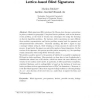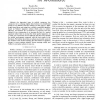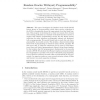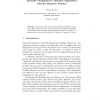79 search results - page 8 / 16 » Fair Blind Signatures without Random Oracles |
ASIACRYPT
2010
Springer
13 years 7 months ago
2010
Springer
Blind signatures (BS), introduced by Chaum, have become a cornerstone in privacy-oriented cryptography. Using hard lattice problems, such as the shortest vector problem, as the bas...
ICC
2007
IEEE
14 years 4 months ago
2007
IEEE
Abstract— An important issue in mobile commerce (mcommerce) is to exchange digital data between two distributed parties in an efficient and fair manner. In this paper, a lightwe...
ASIACRYPT
2010
Springer
13 years 7 months ago
2010
Springer
This paper investigates the Random Oracle Model (ROM) feature known as programmability, which allows security reductions in the ROM to dynamically choose the range points of an ide...
EUROCRYPT
1994
Springer
14 years 1 months ago
1994
Springer
Abstract. We construct the first O(1)-size designated confirmer signatures (DCS) with security in the state-of-the-art model of Camenisch and Michels, Eurocrypt 2000, without rando...
EUROCRYPT
1998
Springer
14 years 2 months ago
1998
Springer
Abstract. Provable security is a very nice property for cryptographic protocols. Unfortunately, in many cases, this is at the cost of a considerable loss in terms of efficiency. Mo...




